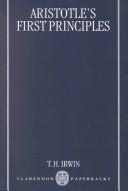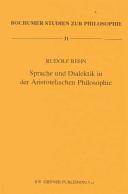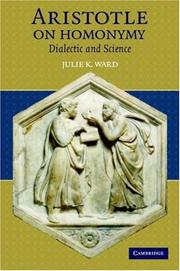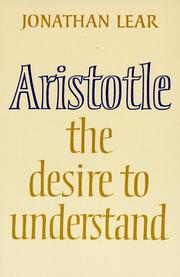| Listing 1 - 10 of 183 | << page >> |
Sort by
|
Book
ISBN: 9004282580 9789004282582 9789004274389 9004274383 1322309663 Year: 2014 Publisher: Boston
Abstract | Keywords | Export | Availability | Bookmark
 Loading...
Loading...Choose an application
- Reference Manager
- EndNote
- RefWorks (Direct export to RefWorks)
New investigations on the content, impact, and criticism of Aristotelianism in Antiquity, the Late Middle Ages, and modern ethics show that Aristotelianism is not an obsolete monolithic doctrine but a living and evolving tradition within philosophy. Modern philosophy and science are sometimes understood as anti-Aristotelian, and Early Modern philosophers often conceived their philosophical project as opposing medieval Aristotelianism. New Perspectives on Aristotelianism and Its Critics brings to light the inner complexity of these simplified oppositions by analysing Aristotle’s philosophy, the Aristotelian tradition, and criticism towards it within three topics – knowledge, rights, and the good life – in ancient, medieval, and modern philosophy. It explores the resources of Aristotle’s philosophy for breaking through some central impasses and simplified dichotomies of the philosophy of our time. Contributors are: John Drummond, Sabine Föllinger, Hallvard Fossheim, Sara Heinämaa, Roberto Lambertini, Virpi Mäkinen, Fred D. Miller, Diana Quarantotto, and Miira Tuominen.
Aristotle. --- Aristoteles --- Aristote --- Aristotle --- Arisṭāṭṭil --- Aristo, --- Aristotel --- Aristotele --- Aristóteles, --- Aristòtil --- Aristotile --- Arisṭū --- Arisṭūṭālīs --- Arisutoteresu --- Arystoteles --- Ya-li-shih-to-te --- Ya-li-ssu-to-te --- Yalishiduode --- Yalisiduode --- Ἀριστοτέλης --- Αριστοτέλης --- Аристотел --- ארסטו --- אריםטו --- אריסטו --- אריסטוטלס --- אריסטוטלוס --- אריסטוטליס --- أرسطاطاليس --- أرسططاليس --- أرسطو --- أرسطوطالس --- أرسطوطاليس --- ابن رشد --- اريسطو --- Pseudo Aristotele --- Pseudo-Aristotle --- アリストテレス

ISBN: 0198247176 0198242905 0191597775 1282052004 019151991X 9786612052002 9780191519918 9780191597770 9780198247173 9780198242901 6612052007 9781282052000 Year: 1988 Publisher: Oxford New York Clarendon Press Oxford Univ. Press
Abstract | Keywords | Export | Availability | Bookmark
 Loading...
Loading...Choose an application
- Reference Manager
- EndNote
- RefWorks (Direct export to RefWorks)
This book emphasises the systemic character of Aristotle's philosophy by examining questions on metaphysics, epistemology, philosophy and mind and ethics. His reliance on dialectic as the method of philosophy appears to conflict with the metaphysical realist view of his conclusions.
Aristotle --- Methodology --- -Philosophy --- Research --- History --- Aristoteles. --- -History --- Aristoteles --- Aristote --- Aristotile --- Aristotle. --- Arisṭāṭṭil --- Aristo, --- Aristotel --- Aristotele --- Aristóteles, --- Aristòtil --- Arisṭū --- Arisṭūṭālīs --- Arisutoteresu --- Arystoteles --- Ya-li-shih-to-te --- Ya-li-ssu-to-te --- Yalishiduode --- Yalisiduode --- Ἀριστοτέλης --- Αριστοτέλης --- Аристотел --- ארסטו --- אריםטו --- אריסטו --- אריסטוטלס --- אריסטוטלוס --- אריסטוטליס --- أرسطاطاليس --- أرسططاليس --- أرسطو --- أرسطوطالس --- أرسطوطاليس --- ابن رشد --- اريسطو --- Pseudo Aristotele --- Pseudo-Aristotle --- アリストテレス --- #GROL:SEMI-1-05'-04' Aris --- History. --- Méthodologie --- Histoire --- Humanities Methodology
Book
ISBN: 9783110218725 3110218720 9783110218732 3110218739 1283164841 9786613164841 9781283164849 6613164844 Year: 2011 Volume: Bd 4 Publisher: Berlin New York De Gruyter
Abstract | Keywords | Export | Availability | Bookmark
 Loading...
Loading...Choose an application
- Reference Manager
- EndNote
- RefWorks (Direct export to RefWorks)
The volume collects the most important papers Pierluigi Donini wrote in the last three decades with the aim of promoting a better assessment of post-hellenistic philosophy. The philosophical relevance of post-hellenistic philosophy is now widely (though not yet universally) recognized. Yet much remains to be done. The common practice of focusing each single school in itself detracts from a balanced assessment of the strategies exploited by many philosophers of the period. On the assumption that debates among schools play a major role in the philosophy of the commentators, Donini concentrates on the interaction between leading Aristotelians and Platonists and demonstrates that the developments of both systems of thought were heavily influenced by a continuous confrontation between the two schools. And whereas in cases such as Alcinous and Aspasius this is basically uncontroversial, for other authors such us Alexander, Antiochus and Plutarch the pioneering work of Donini paves the way for a better understanding of their doctrines and definitely confirms the intellectual importance of the first imperial age, when the foundations were laid of versions of both Aristotelianism and Platonism which were bound to influence the whole history of European thought, from Late Antiquity onwards.
Platonists. --- Platoniciens --- Aristotle. --- Platonists --- Aristotle --- Platonism --- Aristoteles --- Aristote --- Aristotile --- Philosophers --- Philosophy, Ancient --- Aristoteles. --- Arisṭāṭṭil --- Aristo, --- Aristotel --- Aristotele --- Aristóteles, --- Aristòtil --- Arisṭū --- Arisṭūṭālīs --- Arisutoteresu --- Arystoteles --- Ya-li-shih-to-te --- Ya-li-ssu-to-te --- Yalishiduode --- Yalisiduode --- Ἀριστοτέλης --- Αριστοτέλης --- Аристотел --- ארסטו --- אריםטו --- אריסטו --- אריסטוטלס --- אריסטוטלוס --- אריסטוטליס --- أرسطاطاليس --- أرسططاليس --- أرسطو --- أرسطوطالس --- أرسطوطاليس --- ابن رشد --- اريسطو --- Pseudo Aristotele --- Pseudo-Aristotle --- アリストテレス --- Aristotelianism. --- Philosophy, post-hellenistic. --- Pierluigi Donini (scholar). --- Platonism.
Book
ISSN: 18799787 ISBN: 9789004188853 9004188851 9789004192058 9004192050 1283119951 9786613119957 Year: 2011 Volume: 2 Publisher: Leiden Boston Brill
Abstract | Keywords | Export | Availability | Bookmark
 Loading...
Loading...Choose an application
- Reference Manager
- EndNote
- RefWorks (Direct export to RefWorks)
Methods and Methodologies explores two questions about studying the Aristotelian tradition of logic. The first, addressed by the chapters on methods in the first half of the book, is directly about the medieval logical commentaries, treatises and handbooks. How did medieval authors in the different traditions, Latin and Arabic, go about their work on Aristotelian logic? In particular, how did they themselves conceive the relationship between logic and other branches of philosophy and disciplines outside philosophy? The second question is about methodologies, the subject of the chapters in the second half of the book: it invites writers to reflect on their own and their colleagues' practice as twenty-first century interpreters of this medieval writing on Aristotelian logic.Contributors are Sten Ebbesen, Christopher J. Martin, Christophe Erismann, Andrew Arlig, Simo Knuuttila, Amos Bertolacci, Jennifer Ashworth, Paul Thom, Gyula Klima, Matteo di Giovanni and Margaret Cameron
Logic, Medieval --- Muslim logicians --- Aristotle --- Congresses --- Islamic logicians --- Logicians, Muslim --- Logicians --- Medieval logic --- Aristoteles --- Aristote --- Arisṭāṭṭil --- Aristo, --- Aristotel --- Aristotele --- Aristóteles, --- Aristòtil --- Aristotile --- Arisṭū --- Arisṭūṭālīs --- Arisutoteresu --- Arystoteles --- Ya-li-shih-to-te --- Ya-li-ssu-to-te --- Yalishiduode --- Yalisiduode --- Ἀριστοτέλης --- Αριστοτέλης --- Аристотел --- ארסטו --- אריםטו --- אריסטו --- אריסטוטלס --- אריסטוטלוס --- אריסטוטליס --- أرسطاطاليس --- أرسططاليس --- أرسطو --- أرسطوطالس --- أرسطوطاليس --- ابن رشد --- اريسطو --- Pseudo Aristotele --- Pseudo-Aristotle --- アリストテレス --- Logic, Medieval - Congresses --- Muslim logicians - Congresses --- Aristotle - Congresses
Book
ISBN: 9780253353498 0253353491 9780253004376 0253004373 Year: 2009 Volume: *11 Publisher: Bloomington Indiana University Press
Abstract | Keywords | Export | Availability | Bookmark
 Loading...
Loading...Choose an application
- Reference Manager
- EndNote
- RefWorks (Direct export to RefWorks)
Volume 18 of Martin Heidegger's collected works presents his important 1924 Marburg lectures which anticipate much of the revolutionary thinking that he subsequently articulated in Being and Time. Here are the seeds of the ideas that would become Heidegger's unique phenomenology. Heidegger interprets Aristotle's Rhetoric and looks closely at the Greek notion of pathos. These lectures offer special insight into the development of his concepts of care and concern, being-at-hand, being-in-the-world, and attunement, which were later elaborated in Being and Time. Available in English for the fir
Philosophy. --- Mental philosophy --- Aristoteles. --- Aristoteles --- Aristote --- Aristotle --- Aristotile --- Philosophie --- Aristotle. --- Philosophy --- Humanities --- Arisṭāṭṭil --- Aristo, --- Aristotel --- Aristotele --- Aristóteles, --- Aristòtil --- Arisṭū --- Arisṭūṭālīs --- Arisutoteresu --- Arystoteles --- Ya-li-shih-to-te --- Ya-li-ssu-to-te --- Yalishiduode --- Yalisiduode --- Ἀριστοτέλης --- Αριστοτέλης --- Аристотел --- ארסטו --- אריםטו --- אריסטו --- אריסטוטלס --- אריסטוטלוס --- אריסטוטליס --- أرسطاطاليس --- أرسططاليس --- أرسطو --- أرسطوطالس --- أرسطوطاليس --- ابن رشد --- اريسطو --- Pseudo Aristotele --- Pseudo-Aristotle --- アリストテレス
Book
ISSN: 03448142 ISBN: 9783110212365 3110212366 1282934058 9786612934056 3110212374 9783110212372 Year: 2011 Volume: 97 Publisher: Berlin New York De Gruyter
Abstract | Keywords | Export | Availability | Bookmark
 Loading...
Loading...Choose an application
- Reference Manager
- EndNote
- RefWorks (Direct export to RefWorks)
Aristoteles betont an vielen Stellen die zentrale Bedeutung der Wahrnehmung für den Wissenserwerb. Wie sind diese programmatischen Aussagen interpretatorisch einzulösen? Bildet die Wahrnehmung für Aristoteles ein Fundament, das alle anderen Überzeugungen rechtfertigen kann? Oder hat sie bloß die Funktion, den Intellekt mit elementaren Informationen zu versorgen? Aristoteles' Theorie des Wissenserwerbs wurde in der Vergangenheit oft als empiristisch charakterisiert. Dafür scheinen nicht nur die programmatischen Aussagen zum Wert der Wahrnehmung, sondern auch die grundsätzliche Ablehnung angeborenen Wissens zu sprechen; der Wissenserwerb basiert einzig auf der Wahrnehmung als einem unterscheidungsfähigen Vermögen. Die Studie arbeitet heraus, welche Rolle die Wahrnehmung in Aristoteles' Theorie des Wissenserwerbs spielt. Nach einem kurzen Überblick über bisherige Interpretationen wird in einem ersten Teil anhand einer Interpretation zentraler Passagen aus De Anima die Frage geklärt, wie der Gehalt der Wahrnehmung zu bestimmen ist. Auf dieser Grundlage wendet sich die Untersuchung den einschlägigen Passagen zum Wissenserwerb aus den Zweiten Analytiken zu. Es zeigt sich, dass von einem Empirismus in einem starken Sinn nicht gesprochen werden kann. Aristoteles' Position kann als eine systematisch interessante Alternative in die gegenwärtige Epistemologie eingebracht werden.
Perception (Philosophy) --- Knowledge, Theory of. --- Epistemology --- Theory of knowledge --- Philosophy --- Psychology --- Aristotle. --- Aristoteles --- Aristote --- Aristotle --- Aristotile --- Perception (Philosophy). --- Arisṭāṭṭil --- Aristo, --- Aristotel --- Aristotele --- Aristóteles, --- Aristòtil --- Arisṭū --- Arisṭūṭālīs --- Arisutoteresu --- Arystoteles --- Ya-li-shih-to-te --- Ya-li-ssu-to-te --- Yalishiduode --- Yalisiduode --- Ἀριστοτέλης --- Αριστοτέλης --- Аристотел --- ארסטו --- אריםטו --- אריסטו --- אריסטוטלס --- אריסטוטלוס --- אריסטוטליס --- أرسطاطاليس --- أرسططاليس --- أرسطو --- أرسطوطالس --- أرسطوطاليس --- ابن رشد --- اريسطو --- Pseudo Aristotele --- Pseudo-Aristotle --- アリストテレス --- Epistemology. --- Knowledge. --- Perception.

ISBN: 9060323580 9786613174611 1283174618 9027283737 9789027283733 9789060323588 9781283174619 Year: 2000 Volume: 31 Publisher: Amsterdam ; Philadelphia, Pa. : B.R. Gruner,
Abstract | Keywords | Export | Availability | Bookmark
 Loading...
Loading...Choose an application
- Reference Manager
- EndNote
- RefWorks (Direct export to RefWorks)
Entgegen der Ansicht, Aristoteles sei als Sprachphilosoph und -wissenschaftler "nur sehr wenig über Platon hinausgekommen" (H. Arens, R. Haller u.a.), will die vorliegende Untersuchung zeigen, daß Aristoteles einen tiefgreifenden Einschnitt in der Entwicklung der Sprachwissenschaft und -philosophie markiert. Er hat - in Grundzügen - die erste semantische Theorie entworfen, hat als erster eine Schrift über den (Aussage-) Satz verfaßt und hat in der Poetik den ersten systematischen Abriß einer wissenschaftlichen Grammatik vorgelegt.Eine der wesentlichen Ursachen für den Fortschrift innerhalb der antiken sprachphilosophischen Forschung ist in der veränderten Einstellung zur Sprache zu sehen. Bei Aristoteles ist die Identität von Sprache und Denken weitgehend zerbrochen. War für Platon die Sprache noch das Medium, in dem sich jedwede Form der philosophischen Erkenntnis realisierte, so ist die Sprache für Aristoteles (bloß) Ausdruck des Denkens, symbolische Repräsentation von Inhalten der Seele. Hierdurch wurde die Voraussetzung dafür geschaffen, daî sich die Sprache als eigenständiger Gegenstand der Forschung etablieren konnte. Zugleich aber kam es bei Aristoteles zu einer Abwertung der Sprache und (im Zusammenhang damit) zu einer Neubewertung der Dialektik. Für Aristoteles bildet die Dialektik nicht mehr das Zentrum der Philosophie, sondern wird zu einem - allerdings unverzichtbaren - Instrument der philosophischen Forschung.
Dialectic. --- Dialectic --- Dialectiek --- Dialectique --- Language and languages --- Polarity --- Polarity (Philosophy) --- Philosophy --- Aristotle. --- Aristoteles --- Aristote --- Aristotle --- Aristotile --- Aristoteles. --- Arisṭāṭṭil --- Aristo, --- Aristotel --- Aristotele --- Aristóteles, --- Aristòtil --- Arisṭū --- Arisṭūṭālīs --- Arisutoteresu --- Arystoteles --- Ya-li-shih-to-te --- Ya-li-ssu-to-te --- Yalishiduode --- Yalisiduode --- Ἀριστοτέλης --- Αριστοτέλης --- Аристотел --- ארסטו --- אריםטו --- אריסטו --- אריסטוטלס --- אריסטוטלוס --- אריסטוטליס --- أرسطاطاليس --- أرسططاليس --- أرسطو --- أرسطوطالس --- أرسطوطاليس --- ابن رشد --- اريسطو --- Pseudo Aristotele --- Pseudo-Aristotle --- アリストテレス --- Philosophy.

ISBN: 9780521874861 0521874866 9780511663697 9780521128476 9781107322097 110732209X 0511663692 1107198240 9781107198241 1139810677 9781139810678 1107316707 9781107316706 1107317665 9781107317666 1107318580 9781107318588 1299399770 9781299399778 1107315743 9781107315747 0521128471 Year: 2008 Publisher: Cambridge New York Cambridge University Press
Abstract | Keywords | Export | Availability | Bookmark
 Loading...
Loading...Choose an application
- Reference Manager
- EndNote
- RefWorks (Direct export to RefWorks)
Julie K. Ward examines Aristotle's thought regarding how language informs our views of what is real. First she places Aristotle's theory in its historical and philosophical contexts in relation to Plato and Speusippus. Ward then explores Aristotle's theory of language as it is deployed in several works, including Ethics, Topics, Physics, and Metaphysics, so as to consider its relation to dialectical practice and scientific explanation as Aristotle conceived it.
Homonyms --- Homographs --- Homophones --- Puns and punning --- Semantics --- Aristotle --- Aristoteles --- Aristote --- Aristotile --- Language. --- Arisṭāṭṭil --- Aristo, --- Aristotel --- Aristotele --- Aristóteles, --- Aristòtil --- Arisṭū --- Arisṭūṭālīs --- Arisutoteresu --- Arystoteles --- Ya-li-shih-to-te --- Ya-li-ssu-to-te --- Yalishiduode --- Yalisiduode --- Ἀριστοτέλης --- Αριστοτέλης --- Аристотел --- ארסטו --- אריםטו --- אריסטו --- אריסטוטלס --- אריסטוטלוס --- אריסטוטליס --- أرسطاطاليس --- أرسططاليس --- أرسطو --- أرسطوطالس --- أرسطوطاليس --- ابن رشد --- اريسطو --- Pseudo Aristotele --- Pseudo-Aristotle --- アリストテレス --- Homonyms. --- Arts and Humanities --- History

ISBN: 0521345235 9780521347624 0521347629 9780521345231 9780511570612 0511570619 9781107398481 1107398487 9781461949077 1461949076 9781139886246 113988624X 1107384761 1107390060 1107383625 110738723X Year: 1988 Publisher: Cambridge Cambridge University Press
Abstract | Keywords | Export | Availability | Bookmark
 Loading...
Loading...Choose an application
- Reference Manager
- EndNote
- RefWorks (Direct export to RefWorks)
This is a 1988 philosophical introduction to Aristotle, and Professor Lear starts where Aristotle himself starts. The first sentence of the Metaphysics states that all human beings by their nature desire to know. But what is it for us to be animated by this desire in this world? What is it for a creature to have a nature; what is our human nature; what must the world be like to be intelligible; and what must we be like to understand it systematically? Through a consideration of these questions Professor Lear introduces us to the essence of Aristotle's philosophy and guides us through the central Aristotelian texts - selected from the Physics, Metaphysics, Ethics, Politics and from the biological and logical works. The book is written in a direct, lucid style which engages the reader with the themes in an active, participatory manner.
Aristotle --- Aristotle. --- Aristoteles --- Aristote --- Aristotile --- Aristoteles. --- Arisṭāṭṭil --- Aristo, --- Aristotel --- Aristotele --- Aristóteles, --- Aristòtil --- Arisṭū --- Arisṭūṭālīs --- Arisutoteresu --- Arystoteles --- Ya-li-shih-to-te --- Ya-li-ssu-to-te --- Yalishiduode --- Yalisiduode --- Ἀριστοτέλης --- Αριστοτέλης --- Аристотел --- ארסטו --- אריםטו --- אריסטו --- אריסטוטלס --- אריסטוטלוס --- אריסטוטליס --- أرسطاطاليس --- أرسططاليس --- أرسطو --- أرسطوطالس --- أرسطوطاليس --- ابن رشد --- اريسطو --- Pseudo Aristotele --- Pseudo-Aristotle --- アリストテレス --- Arts and Humanities --- Philosophy
Book
ISBN: 9780810134003 9780810134010 9780810134027 0810134020 0810134004 0810134012 Year: 2016 Publisher: Northwestern University Press
Abstract | Keywords | Export | Availability | Bookmark
 Loading...
Loading...Choose an application
- Reference Manager
- EndNote
- RefWorks (Direct export to RefWorks)
The Middle Included is a systematic exploration of the meanings of logos throughout Aristotle’s work. It claims that the basic meaning is “gathering,â€? a relation that holds its terms together without isolating them or collapsing one to the other. This meaning also applies to logos in the sense of human language. Aristotle describes how some animals are capable of understanding non-firsthand experience without being able to relay it, while others relay it without understanding. Aygün argues that what distinguishes human language, for Aristotle, is its ability to both understand and relay firsthand and non-firsthand experiences. This ability is key to understanding the human condition: science, history, news media, propaganda, gossip, utopian fiction, and sophistry, as well as philosophy. Ã-mer Aygün finds Aristotle’s name for this peculiar but crucial human ability of “gatheringâ€? both experiences is logos, and this leads to a claim about the specificity of human rationality and language.
Logos (Philosophy) --- Logos (Philosophie) --- Aristotle. --- Logos --- Philosophy --- Aristoteles --- Aristote --- Aristotle --- Aristotile --- Arisṭāṭṭil --- Aristo, --- Aristotel --- Aristotele --- Aristóteles, --- Aristòtil --- Arisṭū --- Arisṭūṭālīs --- Arisutoteresu --- Arystoteles --- Ya-li-shih-to-te --- Ya-li-ssu-to-te --- Yalishiduode --- Yalisiduode --- Ἀριστοτέλης --- Αριστοτέλης --- Аристотел --- ארסטו --- אריםטו --- אריסטו --- אריסטוטלס --- אריסטוטלוס --- אריסטוטליס --- أرسطاطاليس --- أرسططاليس --- أرسطو --- أرسطوطالس --- أرسطوطاليس --- ابن رشد --- اريسطو --- Pseudo Aristotele --- Pseudo-Aristotle --- アリストテレス
| Listing 1 - 10 of 183 | << page >> |
Sort by
|

 Search
Search Feedback
Feedback About UniCat
About UniCat  Help
Help News
News